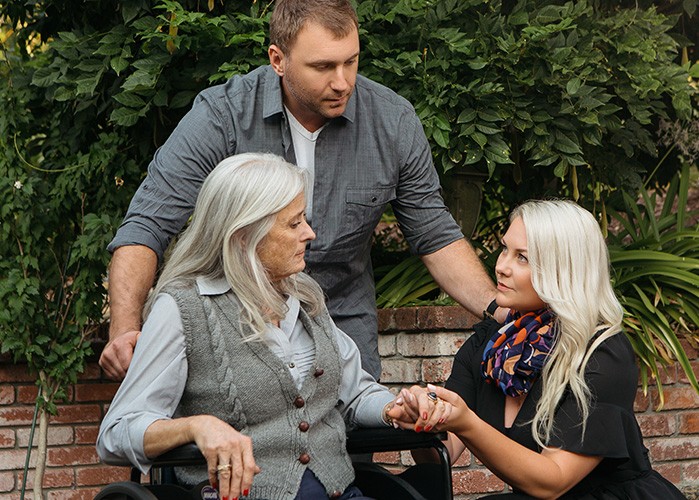Look Both Ways Before Getting a Reverse Mortgage

One American dream is home ownership. For many older adults, the continuing dream is living in our homes as long as we can. For that reason, reverse mortgages, which are a loan against the equity in your house, sound almost too good to be true. You have the option of receiving monthly payments that allow you to stay in your home, and the loan doesn’t require repayment until you die, sell your home or when your home is no longer your primary residence. The proceeds of a reverse mortgage are tax-free, and many reverse mortgages have no income restrictions.
However, you can also look at reverse mortgages as an expensive loan, because when you leave your home, you or your heirs have to repay the loan, plus interest. AARP, for one, recommends using reverse mortgages only as a last option for older homeowners who are cash-poor and face high health care costs. Others view a reverse mortgage as a good tool for older adults to manage their finances, especially when used in conjunction with other assets.
The Federal Reserve reports that the combined debt of Americans from the ages of 65 to 74 is rising faster than that of any other age group. In recent years, many older adults, especially baby boomers, have turned to reverse mortgages because their savings have not kept pace with their expenses. In fact, boomers ages 62 to 64 now represent 20 percent of prospective borrowers (62 is the earliest age you can apply), according to a recent survey by MetLife Mature Market Institute. Nearly half the people considering a reverse mortgage today are under 70.
Getting Tough
Borrowers can choose from several options for reverse mortgage payments—from a monthly payment to a lump sum payment or using the funds as a line of credit—tailored to fit your needs. To discourage borrowers from using the reverse mortgage to take care of financial problems, such as paying off bills, the FHA launched new rules in October 2013, reducing the payment a borrower receives if they take the entire amount immediately (“Reverse mortgages: Safer, but far from risk-free,” February 7, 2014, CNN Money).
Requirements for Borrowers
The FHA requires borrowers to:
• Be 62 or older.
• Own your home outright or have a low mortgage balance that can be paid off at closing with proceeds from the reverse loan.
• Have the financial resources to pay ongoing property charges, including taxes, insurance and other obligations, such as condominium fees.
• Use the home as your primary residence. Vacation property is not eligible.
• Receive consumer information from a reverse mortgage counselor (one approved by the FHA) prior to obtaining the loan.
Costs Associated with Reverse Mortgages
A reverse mortgage is a loan, so you must pay loan-related fees. Because a reverse mortgage is a home equity loan that isn’t based on your income or credit score, and lenders don’t receive interest until the loan comes due, the lender takes on unique risks. Lenders may offset these risks by charging higher fees.
Origination fee: Reverse mortgage origination fees depend on the value of your home. If the value of your home is less than $125,000, your fee can be up to $2,500, but if your home is worth more, you can be charged 2 percent of the first $200,000 in value plus 1 percent of the value above $200,000, with a cap of $6,000.
Mortgage insurance premium (MIP): This fee is paid to the FHA to protect both the lender and the borrower. If you take less than 60 percent of the available funds in the first year, you pay 0.50 percent of the appraised value of the home; if over 60 percent, the upfront MIP will be 2.50 percent. For example, on a $200,000 home, that’s a difference of $4,000.
You are also charged an annual MIP of 1.25 percent on the outstanding loan balance, although this fee doesn’t come out of your available loan proceeds. Rather, it accrues over time, and you pay it once the loan is called due and payable.
Appraisal fee and other closing costs: These fees are the same as you would pay on a traditional mortgage. Home appraisal fees vary by region, type and value of home, but average $450. Other fees—for credit reports, escrow, recording, title insurance, surveys and other items—can range from $1,000 total to more than $2,000.
Interest on the loan: Interest rates depend on whether the loan is fixed or variable. Because the borrower makes no payments during the life of a reverse mortgage, interest is not paid on a current basis but instead accrues, at a compounded rate, through the life of the loan until repayment occurs at the end.
At the current average interest rate of about 5 percent for a reverse mortgage plus insurance, a lump sum mortgage balance of $100,000 would increase by about 6.6 percent a year and the debt would double in 11 years to $200,000 (CNN Money). The interest rate on a reverse mortgage is often higher than the rate for a more traditional home equity loan.
Downsides to Reverse Mortgage
One of the biggest advantages of reverse mortgages is that if you or your spouse stays in your home until the surviving spouse dies, you never need to repay the loan. That means that there will be less, if any, equity in the house for your heirs, although using the reverse mortgage payments to pay your expenses can mean that you have more liquid assets, such as IRAs and mutual funds, to leave behind.
If you die before selling the home, it is sold to cover the loan amount. Any shortfall is covered by the mortgage insurance. If your heirs want the home, they must pay the lesser of the loan amount or 95 percent of the appraised value (made at the time of the loan). Whatever happens, no debt is passed along to the estate or heirs.Because you still own your home, you must pay property taxes, hazard and flood insurance, utilities, fuel, maintenance and other expenses. Just as in a regular mortgage, if you don’t pay your property taxes and homeowners insurance, you’re in default, and the bank can foreclose on your house.
You have to repay the loan when you move out and haven’t lived in the home for a year, including entering a long-term care facility. Having to repay your reverse mortgage at a time when money is likely already tight can be difficult for most people. However, in some states, Medicaid considers a reverse mortgage a loan rather than income, which can make it easier to qualify for Medicaid. (On the bright side, if the property is “upside down,” which means that the property is worth less than the amount of the reverse mortgage, then the insurance used in the transaction at the time of the reverse mortgage covers that difference. The borrower or heirs are not responsible for the difference.)
Finally, interest on reverse mortgages is not deductible on income tax returns until the loan is paid off in part or whole.
Before deciding whether a reverse mortgage would work for you, consult with a competent financial planner and elder law attorney. Your Certified Senior Advisor can assist you in directing you to a qualified reverse mortgage professional who can help you with the process of determining if it might be appropriate for you. One key thing to remember is that although you can qualify for a reverse mortgage beginning at age 62, the older you are when you apply, the greater the percentage of your home equity you will be able to turn into cash to help meet your financial needs.
Sources
“5 Reasons to Avoid a Reverse Mortgage,” Dec. 11, 2012, US News Money“Reverse Mortgages,” Federal Trade Commission
“Are Reverse Mortgages Helpful or Hazardous?” April 2013 AARP Money
“Are Reverse Mortgages Risky?,” March 5, 2012 National Reverse Mortgage Lenders Association
“Reverse Mortgage Insurance Explained,” Reversemortgage.net
# # #
Reprinted by Always Best Care Senior Services with permission fromSenior Spirit, the newsletter of the Society of Certified Senior Advisors
The Certified Senior Advisor (CSA) program provides the advanced knowledge and practical tools to serve seniors at the highest level possible while providing recipients a powerful credential that increases their competitive advantage over other professionals. The CSA works closely with Always Best Care Senior Services to help ABC business owners understand how to build effective relationships with seniors based on a broad-based knowledge of the health, social and financial issues that are important to seniors, and the dynamics of how these factors work together in seniors’ lives. To be a Certified Senior Advisor (CSA) means one willingly accepts and vigilantly upholds the standards in the CSA Code of Professional Responsibility. These standards define the behavior that we owe to seniors, to ourselves, and to our fellow CSAs. The reputation built over the years by the hard work and high standards of CSAs flows to everyone who adds the designation to their name.
Always Best Care Senior Services
Founded in 1996, Always Best Care Senior Services is based on the belief that having the right people for the right level of care means peace of mind for the client and family. Always Best Care assists seniors with a wide range of illnesses and personal needs, and currently provides more than 3 million hours of care every year. Franchise opportunities are available to individuals interested in leveraging the company’s clear strategy and proven track record for delivering affordable, dependable service to seniors in their local areas.
By working with case managers, social workers, discharge planners, doctors, and families, Always Best Care franchise owners provide affordable, comprehensive solutions that can be specifically matched to meet a client’s particular physical or social needs. The hallmark services of the Always Best Care business portfolio include non-medical in-home care and assisted living finder and referral services, with skilled home health care now being phased in throughout the country. For more information, visit www.AlwaysBestCare.com. For franchise opportunities, visit www.FranchiseWithAlwaysBestCare.com.
Always Best Care also offers Always in Touch, a telephone reassurance program that provides a daily phone call to seniors and disabled adults who are living alone and have limited contact with the outside world. Always in Touch is the only absolutely free national telephone reassurance program of its kind anywhere in the USA and Canada. For more information on Always in Touch, or to request an application, visit www.Always-in-Touch.com.
Another special program from Always Best Care is Always on Call –provided free to Always Best Care clients and their families with a minimum of 5 hours of monthly care. Families will have anytime access to physicians 24/7 if they’re considering ER or urgent care for non-emergency issues, if they need a non-narcotic prescription or refill, if they can’t take time off from work or school, if they’re traveling and need medical care, if their primary physician is not available, or if they have a sick child, spouse or elderly parent. This special service is provided to Always Best Care clients and their families by 24HourMDNow, an independent company not affiliated with Always Best Care.
June, 2014
To print this article CLICK HERE





